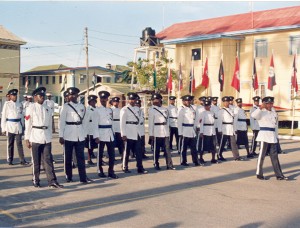By David Granger
Onlookers at the Guyana Police Force’s169th anniversary parade last July must have been astonished at the sight of some Britishers in typical beachcombers’ gear marching amidst their differently attired Guyanese counterparts. What was important, however, was not their uncommon apparel but their serious mission in this country.

The Britishers belonged to a seven-man London Metropolitan Police Service team which had been conducting a three-week training programme for members of the police force’s Tactical Services Unit as part of the British support for Guyana’s Security Sector Reform Action Plan. Mr Paul Slowe, the assistant commissioner who is director of police operations, explained that some aspects of the training were tactically oriented and similar to those of a Special Weapons and Tactics unit.
But is this the type of training that is most needed and will it be more successful this time? Back in 2004, Chief Superintendent Paul Robinson led another British team that trained 100 members of the same Tactical Services Unit who were meant to become the core of the Special Weapons and Tactics unit. Where are they now?
Although there is great concern about the massacres at Agricola, Bartica, Eccles, La Bonne Intention, Lindo Creek, Lusignan and elsewhere, and about the murderous attacks by pirates off the Corentyne Coast, it would be an error to think that SWAT teams will be the magical solution to countering criminal violence. The fact is that in most extreme cases, there had been no intelligence to anticipate the intentions of the bandits and pirates and, after the incidents, there was usually a lack of resources to enable a timely deployment of counter-crime units, even if such units existed. The country is simply too vast, distances are too great and policemen too few to permit the establishment of enough SWAT teams to cover the coastland and hinterland.
Fierce criminals are relatively rare. Timely intelligence, efficient administration and thorough training of sleuths are more likely to succeed in combating crimes and dismantling gangs than excessive reliance on a super squad of gunslingers.
Although certain political elements seem to be obsessed with the establishment of a so-called SWAT unit, the British have been quietly conducting other more important technical training. Earlier this year, Mr. Tod O’Brien ran a short course for policemen in the operations room and force control centre. In March, Tim Hanley and David Mc William provided training in crime intelligence, advised on structures and conducted a needs analysis for establishing a new, expanded Criminal Intelligence Unit. These have been useful measures.
The police force has also always conducted scores of minor courses and seminars on its own. In addition, liberal education policies have assisted members of the force to attend external courses at the University of Guyana and in foreign countries. But, given the impecunious state of the force’s administration, the parlous condition of its infrastructure and the dubious qualification of some local instructors, how efficiently have such courses been conducted and how effective has such training been in solving crime and building a professional force?
As long ago as June 2003 when he was under dire pressure of the troubles on the East Coast, then Minister of Home Affairs Mr Ronald Gajraj promised to establish a specialised training centre where police and other law enforcement officers could undergo modern anti-crime training. He went so far as to say “We are in the process of acquiring the plot of land for the new training centre.” That was five years ago. Little has been done to establish the new centre although some steps have been taken recently to relocate the existing Felix Austin Police College within the force’s Eve Leary property.
Training facilities outside of Georgetown are in a sad shape. Referring to the police training school at Adventure on the Corentyne, Mr Clinton Conway, the assistant commissioner who is the commander of ‘B’ division in Berbice, complained “The place is there and it is under-utilized and there is always a shortage of police ranks so, if it is restored, we can start training people right here in Berbice.” In February, he had to seek assistance from the Central Corentyne Chamber of Commerce to renovate the structure. The repairs and supplies seemed quite elementary − painting, fixing windows and buying beds. Typically, no help came not from the Ministry of Home Affairs. But, how prudent can it be for a law enforcement agency to accept pecuniary assistance from local businessmen in a region riddled with contraband, corruption and crime?
Even before the problems facing local police training can be resolved, the force needs to improve the management of its human resources. This does not require foreign aid. Speaking at the same 169th anniversary award ceremony last month, Commissioner of Police Mr Henry Greene confessed that the force was facing a great challenge to attract and retain personnel. In this regard, he made a public plea for citizens to encourage youths to pursue a police career. That won’t be enough.
Since November 2003 when he was an assistant commissioner in charge of administration, Mr Henry Greene had told the Disciplined Forces Commission that two major problems were the poor quality of recruits and the low level of staffing in the force. Over the years, the force fell into the habit of distributing policemen on numerous cushy jobs in the courts, credit union, the officers’ mess, the finance department and the immigration department. All of these jobs could be done by female civilian employees, perhaps more efficiently and less expensively. This would put more trained policemen into the criminal investigation department and the woefully undermanned rural and hinterland divisions.
The force has been losing more that 250 members every year, more than half of whom simply abscond from duty. It has been unable to attract and retain an equal number of recruits hence it is currently about 600 below its establishment strength and is chronically understaffed. The basic monthly salary of about US$160 is insufficient to attract educated and ambitious youths into the rough and risky regime of policing in this country. The result is that only the less educated show interest in joining and often for the wrong reasons.
In addition, owing to the high rate of resignations, several of those who benefitted from training on internal courses, such as the British conducted SWAT course in 2004, have left the force or have been transferred to other divisions where their expertise is not being fully utilised. Mr Greene had stated that the police plan was to deploy trained Tactical Service Unit sub units to every police station to enable quicker response to violent crime. But this is unlikely to happen anytime soon.
Another personnel problem has arisen out of the perception that the Tactical Services Unit has become a refuge for delinquents, disruptive elements and assorted under-achievers. They are hardly the fittest persons to form an elite unit to effectively combat criminals who are not only very cruel but also very crafty.
This country’s public safety problems will be solved only by police officers who can generate timely intelligence, conduct efficient investigations and direct strong training institutions. The administration has not displayed strong enthusiasm for this aspect of policing, preferring to respond to the chronic understaffing by supplanting the professional police with transitory community police and undertrained neighbourhood police who actually do little to solve serious crimes.
At present even in the regular force, still too much emphasis is placed on experience and long service rather than intelligence and initiative in the promotion of officers. Although opportunities exist for higher education at the University of Guyana and elsewhere, the majority of gazetted officers are still selected from the rank and file of the force entry to which is based only on a primary school education. In fact, only about 20 per cent of the members of the force pass their internal examinations to qualify for higher ranks, for example from constable to corporal, from sergeant to inspector or to gazetted ranks (ie, assistant superintendent and above).
Solving the types of crimes which have become prevalent in this country over the past 20 years, however, suggests that a new type of training based on secondary and tertiary education is needed to produce a new type of police officer. Modern policing requires a new range of scientific skills to deal with transnational crimes such as narcotics-trafficking, gun-running, people-smuggling and money-laundering. More important, because of the lucrative nature of these types of crime, venal, poorly paid police officers can be enlisted as accessories to criminal enterprises.
The ad hoc, three-week courses conducted by foreign trainers can be no more than stop-gap remedies for long-term problems. The police force cannot be rebuilt and reformed by these visiting relations, no matter how frequent. Security sector reform is a two-way street and the administration must seriously reconsider a locally-driven strategic personnel plan. The payment of salaries to professional police officers and constables must be increased to convince more intelligent school leavers that a career in the police force is worth considering.
This will be the start of retraining the national police force, retaining talented officers and solving the complex crimes which continue to plague this country.









